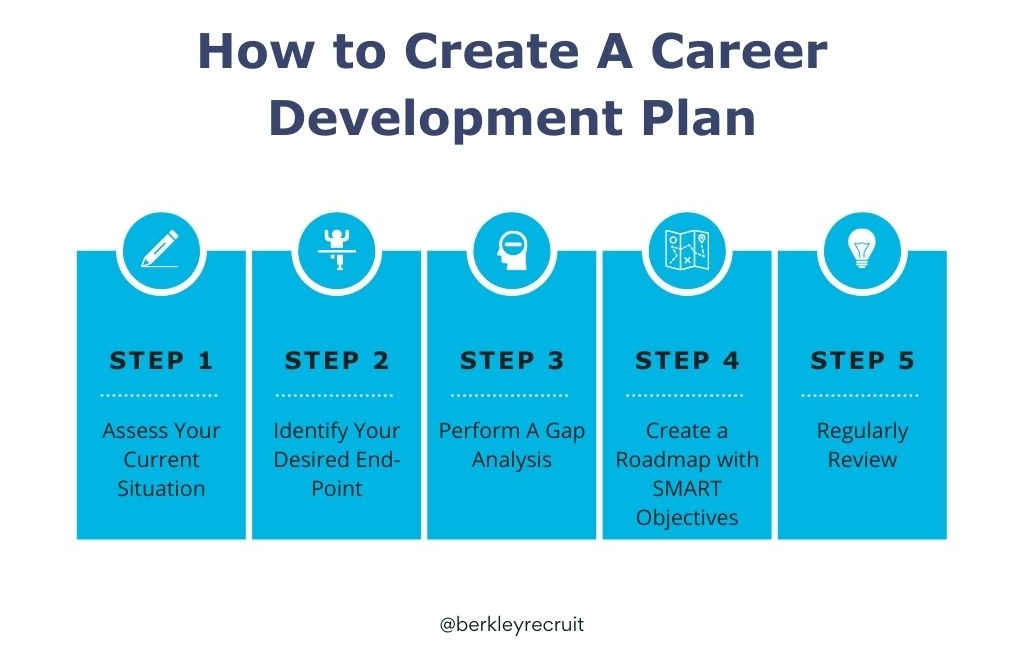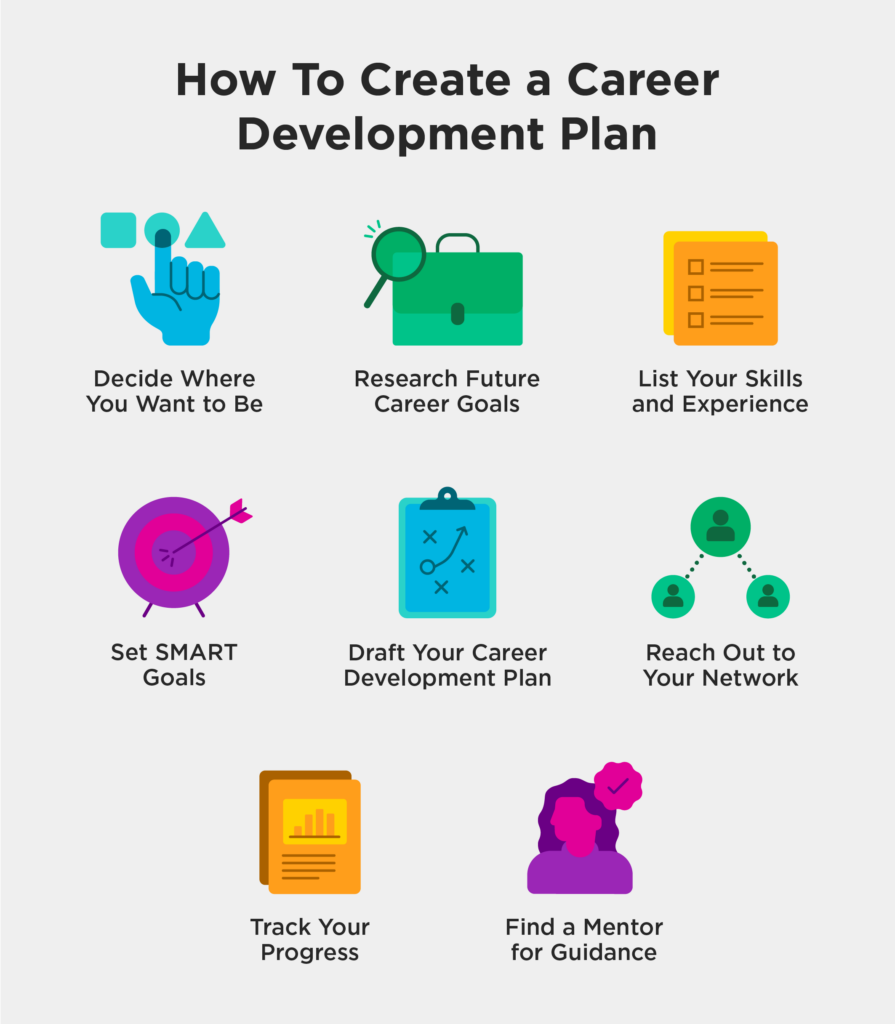Creating a Career Growth Plan: A Blueprint for Professional Success
In today’s dynamic job market, career growth is more important than ever. To succeed and thrive in your professional life, it’s essential to have a clear and actionable plan. A career growth plan acts as a roadmap, helping you set goals, develop skills, and achieve milestones that will ultimately advance your career. Whether you’re aiming for a promotion, transitioning to a new industry, or simply seeking professional development, creating a career growth plan is key to unlocking your full potential.

What is a Career Growth Plan?
A career growth plan is a strategic document that outlines your professional goals, the skills you need to acquire, and the steps you will take to achieve those goals. Think of it as your personal career development blueprint. This plan helps you stay focused, organized, and motivated throughout your career journey.
Why is a Career Growth Plan Important?
Having a career growth plan is crucial for several reasons:
- Clarity and Direction: A plan provides you with clear career goals, which helps you understand where you are headed and how to get there.
- Motivation: By setting achievable goals and milestones, you can stay motivated and focused on the bigger picture.
- Skill Development: A career plan helps you identify the skills you need to develop to remain competitive in your field.
- Career Advancement: A well-structured plan positions you for promotions, raises, or new job opportunities.
Steps to Create a Career Growth Plan
Creating an effective career growth plan requires careful thought, self-reflection, and research. Let’s break it down into actionable steps:
1. Assess Your Current Career Situation
Before you can begin planning your career growth, it’s essential to take stock of where you are. This involves reflecting on your current skills, experience, strengths, and weaknesses.
Key Questions to Consider:
- What are your key accomplishments so far?
- What skills do you excel at?
- Are there any areas where you need to improve?
- What does your ideal career path look like?
2. Set Clear Career Goals
Setting clear and achievable goals is crucial to your growth. Think about where you want to be in the next 1, 3, or 5 years and break it down into smaller, actionable goals.
Types of Career Goals:
- Short-term Goals: These can be achieved within the next 6 months to a year and could include taking on new responsibilities or completing a certification course.
- Long-term Goals: These focus on bigger milestones such as securing a managerial role, switching industries, or achieving a specific salary level.
Make sure your goals are SMART:
– Specific: Clearly define what you want to achieve.
– Measurable: Make sure you can track your progress.
– Achievable: Set realistic goals based on your current skills and experience.
– Relevant: Ensure the goal aligns with your overall career aspirations.
– Time-bound: Set a realistic timeframe to accomplish your goals.

3. Identify the Skills You Need
To move forward in your career, you need to continuously develop your skills. Take a close look at your industry, job market trends, and your personal goals to identify the skills required for growth. Soft skills like communication and leadership, as well as hard skills like technical expertise, are both crucial for your professional development.
Examples of Skills to Develop:
- Technical Skills: Stay updated with the latest tools and technologies relevant to your field.
- Leadership Skills: Strong leadership can propel your career forward, whether you’re managing teams or projects.
- Problem-Solving Skills: Being able to think critically and solve complex problems is highly valuable.
- Emotional Intelligence (EQ): Developing empathy, self-awareness, and social skills is crucial for workplace success.
4. Create a Roadmap for Development
Once you’ve identified the skills you need to develop, it’s time to map out the specific steps you’ll take. These steps should be actionable and time-sensitive. A career growth plan without clear actions is simply a dream. Here’s how to create a concrete roadmap:
Steps to Follow:
- Training and Education: Enroll in courses or certifications that will help you develop the skills needed.
- Networking: Build connections with colleagues, mentors, and industry leaders.
- Find a Mentor: A mentor can provide guidance, feedback, and career advice.
- Take on Challenging Projects: Volunteering for high-profile projects can help you gain new experiences.
- Track Progress: Regularly assess your progress and adjust your plan accordingly.
5. Seek Feedback and Adjust Your Plan
One of the most important elements of a career growth plan is ongoing feedback. Regularly seek feedback from your peers, managers, or mentors to gauge how well you’re progressing. Be open to constructive criticism, and make adjustments as needed to stay on track.
Tips for Seeking Feedback:
- Ask specific questions about areas you need to improve.
- Be open to feedback and use it to improve your plan.
- Don’t be afraid to reassess your goals if they no longer align with your aspirations.
![]()
6. Evaluate and Revise Your Plan Regularly
Your career goals and aspirations may evolve over time, so it’s important to review your career growth plan regularly. This allows you to stay flexible and adapt to new challenges, opportunities, or changes in your personal life.
- Set quarterly reviews to assess your goals and progress.
- Adjust your plan based on new opportunities or challenges that arise.
- Celebrate milestones and use them as motivation to continue progressing.
Key Considerations for Successful Career Growth
A career growth plan is only effective if you follow it consistently and make the most out of it. Here are some additional key considerations for ensuring success:
1. Focus on Work-Life Balance
While career growth is important, it’s equally essential to maintain a healthy work-life balance. Burnout can undermine all of your efforts to advance your career. Regularly assess your well-being and make sure you’re taking time for self-care, family, and personal pursuits.
2. Embrace Change and Adaptability
The modern workplace is constantly evolving, so it’s important to stay adaptable. Whether it’s a new technological tool, a change in company culture, or an industry shift, being open to change and adapting accordingly will keep you ahead of the curve.
3. Stay Focused on Your Why
Having a clear sense of purpose is vital for career growth. Knowing why you want to grow professionally and staying focused on that vision will help you overcome obstacles along the way. Keep your long-term goals in mind and always align your actions with your core values.
FAQs About Career Growth Plans
1. How often should I update my career growth plan?
It’s recommended to review your career growth plan at least once every quarter. This gives you a chance to reflect on your progress, adjust your goals, and keep your plan aligned with changing circumstances.
2. Can a career growth plan help me switch industries?
Yes, a career growth plan can be a powerful tool for career transition. By identifying transferable skills, setting new goals, and gaining relevant experience, you can successfully pivot to a new industry.
3. What if I don’t know what my career goals are?
If you’re unsure about your career goals, start by conducting a self-assessment. Consider your strengths, interests, and values. You can also speak with mentors or career coaches to gain clarity and perspective.
4. How do I stay motivated in my career growth plan?
Staying motivated can be challenging, especially when progress is slow. Break your goals into smaller tasks, celebrate small wins, and keep reminding yourself of the larger purpose behind your career growth. Accountability partners, such as mentors or colleagues, can also keep you motivated.
Conclusion
Creating a career growth plan is one of the best investments you can make in your professional life. By clearly defining your goals, identifying the skills you need to develop, and regularly assessing your progress, you’ll be well on your way to achieving the success you desire. Whether you’re looking to climb the corporate ladder, shift industries, or simply become more effective in your current role, a solid plan will guide you to your next level of achievement.
Start today and take the first step toward realizing your full potential by crafting a personalized career growth plan that works for you!

